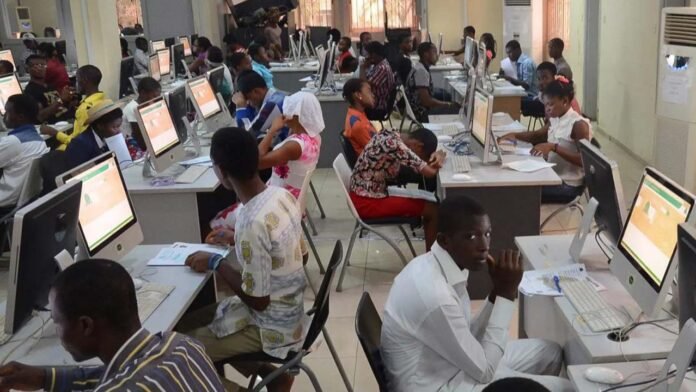Nigeria’s education system is battling a dangerous enemy — high-tech examination malpractice.
During the 2025 Unified Tertiary Matriculation Examination (UTME), the Joint Admissions and Matriculation Board (JAMB) recorded 6,458 confirmed cases. The number is shocking, but what makes it worse is how the methods have evolved.
“This is no longer just about smuggling notes into halls,” a JAMB official said. “We are now dealing with impersonation rings, biometric fraud, and sophisticated identity manipulation.”
For decades, malpractice in Nigerian exams was simple. Students relied on leaked papers, copying notes, or bribing invigilators. But in today’s digital Nigeria, where smartphones and AI tools are common, malpractice has gone online.
JAMB revealed that candidates now use fake fingerprints to bypass biometric checks. Some pay stand-ins to sit for the exams. Others exploit hacked software to alter scores.
The problem is not new. Back in 2013, the West African Examinations Council (WAEC) blacklisted several secondary schools for “persistent and wilful malpractice.” But what once looked like local corner-room cheating is now a full-blown tech industry.
Nigeria’s Examination Malpractice Act of 1999 prescribes up to four years in prison or a ₦100,000 fine for offenders. Yet the law has not been updated in 25 years, long before AI apps, biometric kits, or online proctoring existed.
Calls for Reform and Stronger Laws
Experts say the law is outdated and must be reviewed.
Professor Is-haq Oloyede, JAMB Registrar, has repeatedly warned that the system cannot survive if cheating continues at this scale. “If this culture persists, our certificates will lose value, not just in Nigeria but abroad,” he said.
Education analysts argue that reform should include stiffer penalties, digital forensics units, and partnerships with telecoms to monitor suspicious activities during exams.

Countries like India have already modernised their exam laws. In 2024, India passed an anti-cheating act with up to 10 years’ jail for organised exam fraud. Nigeria, by comparison, still prosecutes most cases as simple misdemeanours.
Would you support stricter punishments for exam malpractice, even jail terms? Or do you think the focus should be on prevention?
Technology as Both Weapon and Shield
Cheaters may use technology, but experts say technology can also be the solution.
Biometric verification is already in use, but there are gaps. Security experts suggest AI-powered proctoring to scan candidates’ eye movement, typing patterns, and even unusual pauses.
Some universities abroad already use lockdown browsers that block all background apps during online exams. Combined with automated analysis of answers, these systems can detect patterns of collusion among groups of students.
But in Nigeria, these measures may face funding and infrastructure problems. Poor internet service, unstable power supply, and limited technical know-how make advanced monitoring difficult.
Still, JAMB insists it will keep improving. “We will not surrender to fraudsters,” the board said. “Each year, they come with new tricks. Each year, we must be smarter.”
The Role of Parents and Communities
Cheating is not only about students. It often involves parents, teachers, and corrupt officials.
In 2022, JAMB arrested several parents who paid syndicates to help their children cheat. Some even followed their wards to exam centres to ensure deals went smoothly.
Educational experts argue that this moral rot is as dangerous as the technology itself. Without cultural change, no level of surveillance will work.
Schools are now urged to run integrity campaigns, while civil groups push for youth mentorship. The Federal Ministry of Education also launched a policy paper in 2024 calling for national debate on the menace.
As one university lecturer in Ibadan put it: “We are raising a generation that wants results without effort. That is a threat to the future.”
A Fight for the Soul of Education
Nigeria stands at a crossroads. With over 1.9 million candidates sitting for UTME yearly, the stakes are high. Every parent, teacher, and policymaker is part of the struggle.
The question is whether Nigeria will continue with outdated tools or embrace a comprehensive approach — new laws, modern tech, strict enforcement, and cultural change.
Cheating is no longer just a classroom issue. It is a battle for the credibility of the nation’s future workforce and its future. And in this battle, silence is surrender.
Rate, Like 👍, Comment💬, share this article, Follow us on our social media handles, and Submit your own story to get featured and earn rewards!








